Tour Tri-State Bird Rescue's Newark area center and learn about their work
If an oil spill happens on the East Coast there are few organizations that can be called upon to come to the aid of injured wildlife.
For nearly four decades, Tri-State Bird Rescue based near Newark has been answering the call.
Over 300 species of birds migrate in and out of Delaware every year, and Newark's Tri-State Bird Rescue and Research has seen it all. Every year the center admits over 3,000 birds.
Lisa Smith has been with the organization since 1986, working in the clinic and on the board before stepping up as executive director in 2011. Smith is a lifelong birder who graduated from the University of Delaware with a degree in biology.
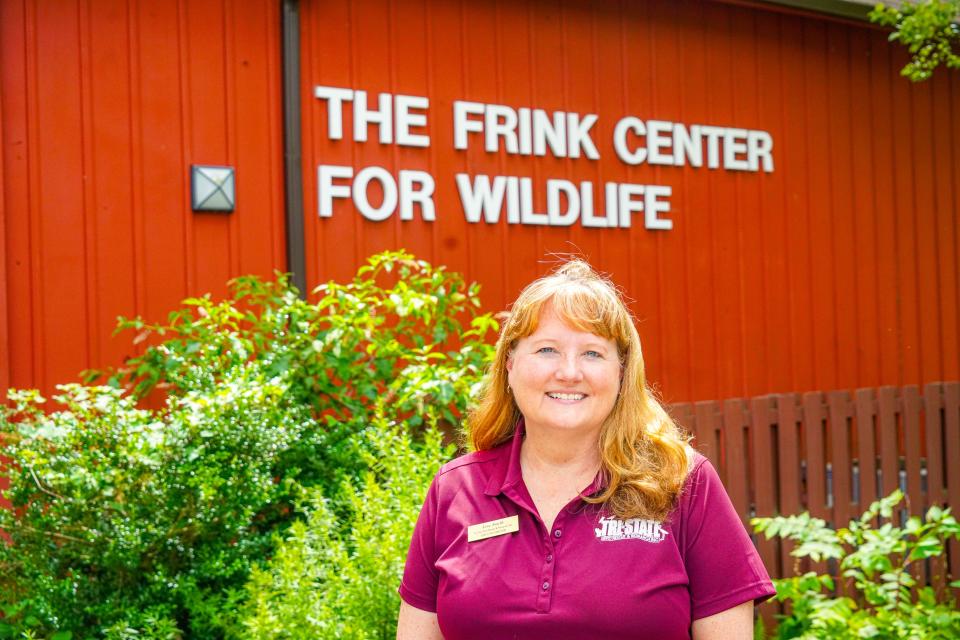
Smith's 18-person staff and dozens of volunteers work 365 days a year to treat native and wild birds, and their process is down to a science
More: A sneak peek at Faithful Friends' new animal shelter near New Castle
Tri-State's history
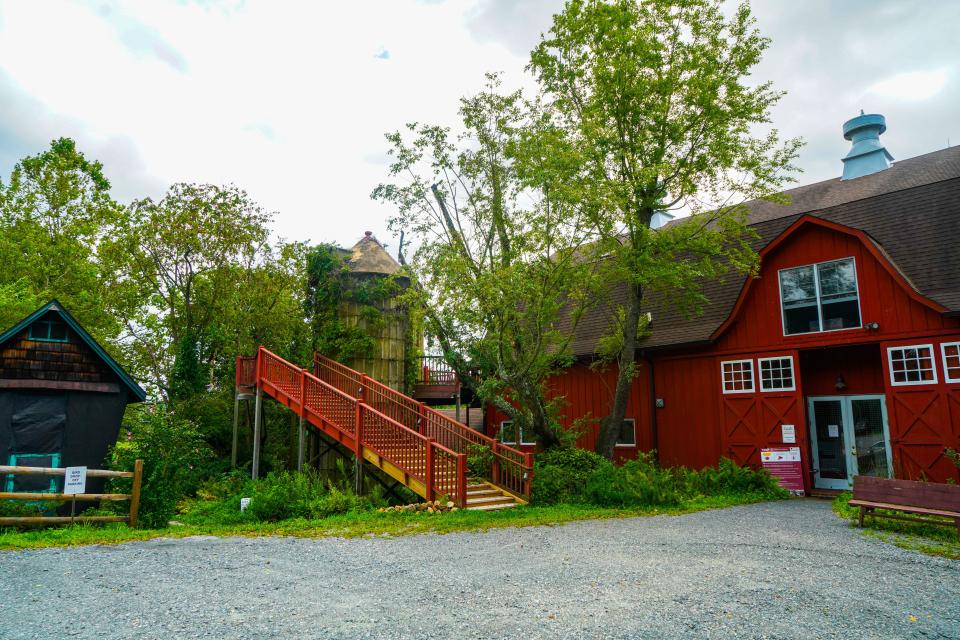
Tri-State Bird Rescue was born in the aftermath of the 1976 oil spill from a Liberian tanker in the Delaware River, which killed tens of thousands of animals. The organization's founder Lynne Frink, an avid birder and later a co-founder of the Delaware Audubon Society, organized a team of biologists, chemists and veterinarians to not only care for the injured birds but find ways to improve the rehabilitation process.
Six years later, a full-time clinic was opened for sick, injured or orphaned wild birds. Due to an overwhelming number of cases, Tri-State moved its headquarters twice before leasing its current home, an 11-acre site off Possum Hollow Road.
Today it stands as the only officially qualified oil wildlife responder on the East Coast and the only federally permitted bird rehabilitation center in the Delmarva area, accepting patients anywhere within a 6-hour driving radius. They travel from Canada to the Caribbean to respond to a crisis.
Saving Delaware's wildlife
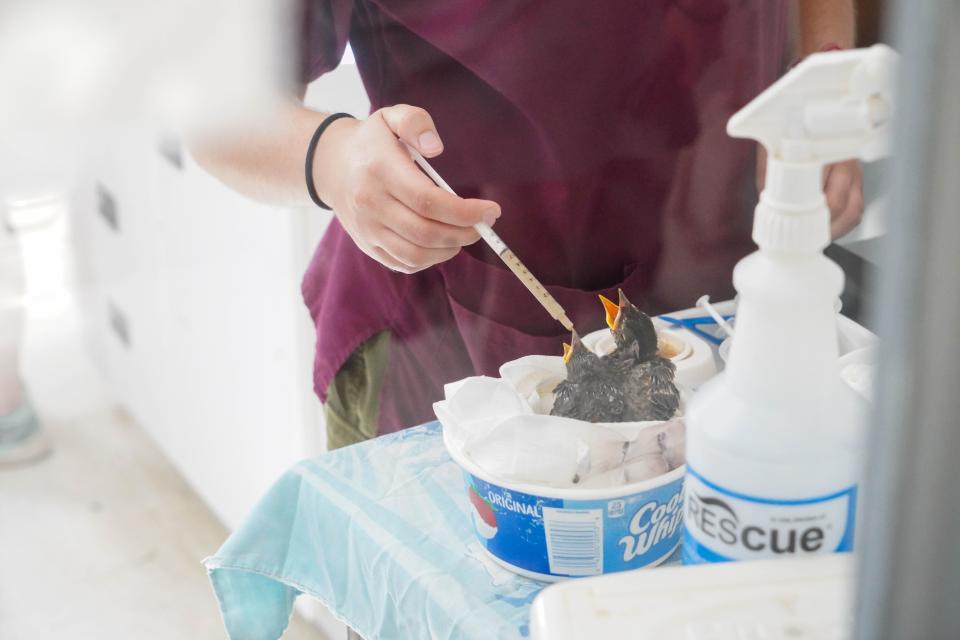
The facility is located at the end of Possum Hollow Road in a quiet environment surrounded by trees that wild birds perch on. Tri-State itself has cultivated an equally calm space, putting the comfort of its patients first.
"One of the main things with birds is that they are wild and we (humans) are a predator," Smith said. "We're here to help but they don't know that. We really minimize how much we handle or even look at the birds."
The facility opens to its baby bird nursery, where the staff cares for all ages and types of baby birds. Incubators are set to different temperatures depending on how a bird's feather count. They are hand fed by a staff member every 20 to 30 minutes.
Just past the nursery, a staff member strategically places insects in the birds' habitat for them to practice their foraging skills before they are re-released into the wild.
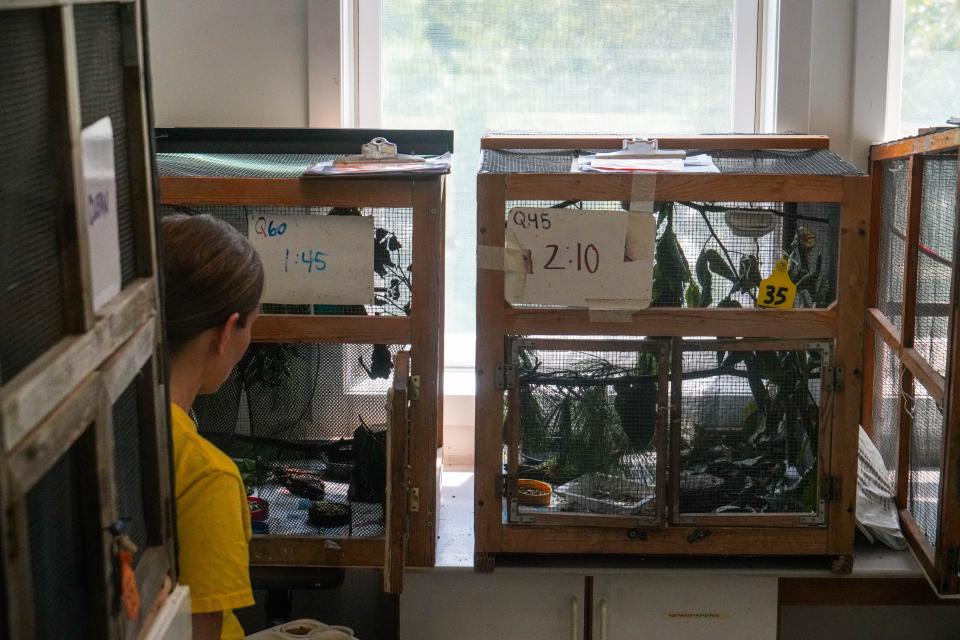
Wild and adult birds are kept in a secluded room, with visual barriers from the caretakers. Individual cages vary in their size and environment based on the type of bird - a pigeon rehabilitation wing (mind the pun) is equipped with a full spectrum light fixture to aid in feather development, while other areas are specifically designated for songbirds or birds of prey to keep them near species they would be familiar with in the wild.
As the birds grow, so do their habitats. Screened cages are placed near the windows and decorated with branches, leaves and seeds for the birds to practice their foraging before being released into the wild.
More: Potbellied pigs now considered invasive species; new permit required for Delaware owners
Smith and her staff stock a closet with different types of bark, perches and greenery.
Volunteer staff members are sometimes tasked with cutting fresh strawberries, cherries and other fruits for their patients, but the facility's refrigerator is not for the faint of heart. It's stocked bird food that includes dead rodents, fish, bugs and even other dead birds.
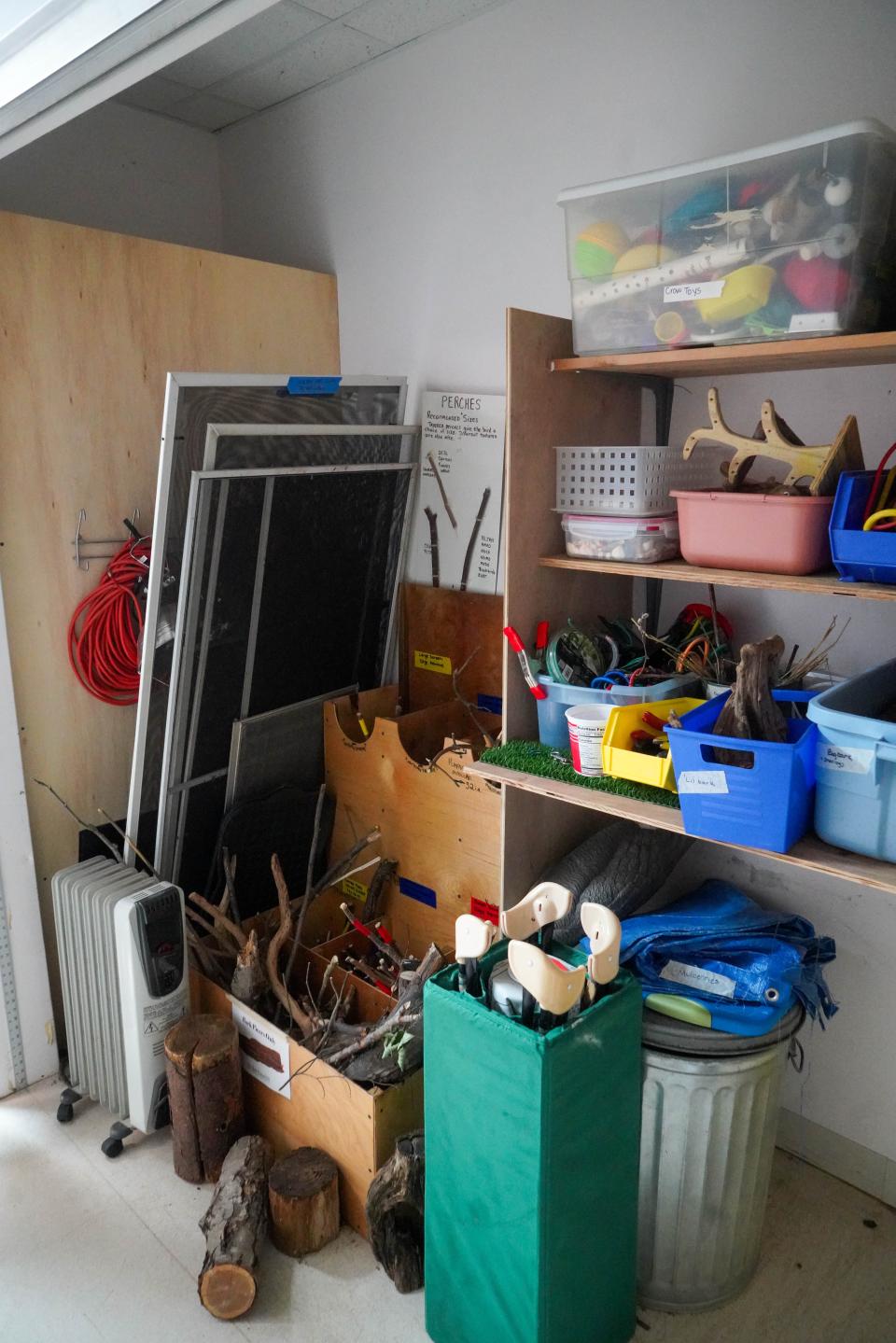
The facility's bathroom is even set up to make water birds more comfortable while swimming with shower curtains that depict a waterfront scenery and an overhead mirror so staffers can check on the birds without spooking them.
Answering the call
According to Smith, a large majority of the bird injuries they treat are human-caused: birds hit by a car, attacked by a pet, entangled in fishing line or soccer nets, stuck to glue traps and people who "bird-nap" healthy young birds.
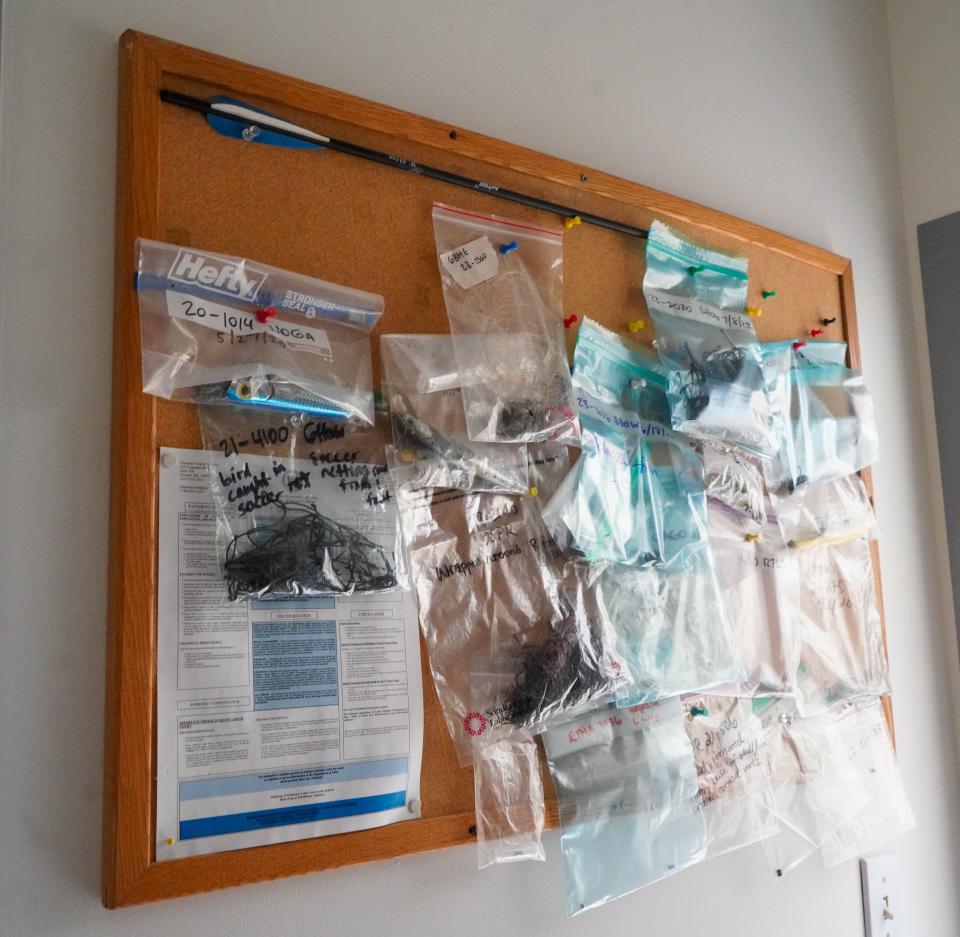
A "wall of shame" is hung up in the headquarters, adorned with the different hazards that have been removed from birds in the facility's care including everything from fishing lines to bullets that had to be surgically removed from the animals.
In any given year, staffers will respond to over 20,000 calls; and that's not counting the emails and texts sent to the front office from people asking for advice on how to care for injured or sick birds.
Also organizations from other states and areas frequently reach out to collaborate with the staff.
Tundra Swan release from Tri-State Bird Rescue & Research on Vimeo.
Late last month a young peregrine falcon, usually a high-perching city bird, was found immobile on the sidewalk. After being brought into the facility, an X-ray showed the bird suffered a fractured collarbone. After being nursed back to health, staff members found that the bird's family had left its original nest location.
With the help of another organization, Tri-State found a foster falcon family where it has been able to grow and heal in a monitored and safe environment.
Smith, who can now recognize the call of nearly any baby bird she hears, has just about seen it all in her over 30-years of experience.
"The birds just face such incredible odds, it feels like every release is a major victory," Smith said. "For an adult bird to allow a human to pick it up, it has to be in really bad shape. So to be able to rehabilitate that bird and return it into the wild is always exciting."
Preparing for the worst
Tri-State also uses their vast knowledge and caseloads to contribute to avian research. Veterinarians and lab specialists typically send their observations to researchers who are conducting their own studies.
"The main research that we are the drivers for is researching what types of detergents work best at removing oil from feathers," Smith said. "We've been doing that for probably 20 or 30 years and publishing papers periodically."
More: How this Lewes nonprofit has spearheaded marine animal conservation in Delaware
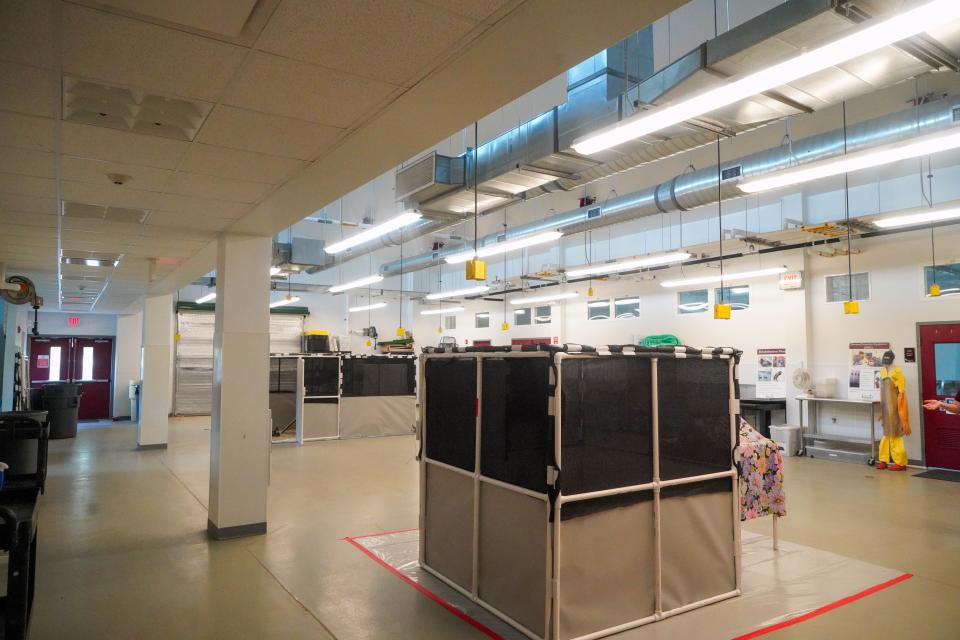
Tri-State's hallmark is its $3.5 million wildlife response center that can accommodate hundreds of birds after a crisis like an oil spill.
There are six different outdoor enclosures that border 650 acres of county-owned natural land with built-in pools and feeding stations for the birds to use. There are also larger flight pens in place for birds like bald eagles that need enough space to practice flight exercises.
How to help
Around one-third of the center's funding is through private donations from individuals. Individuals can sign up to become a member of Tri-State Bird Rescue & Research, providing the center with regular donations while also receiving discounts on merchandise, invitations to special events and discounts with local merchants.
Singular donations can be made.
If you find an injured bird, you can call Tri-State Bird Rescue and Research at 302-737-9543 for assistance. Birds can also be brought to its facility between the hours of 9 a.m. and 5 p.m. at 170 Possum Hollow Road in Newark.
Those interested in volunteering with Tri-State can apply by emailing volunteer@tristatebird.org for access to the application link. Following acceptance, there are mandatory orientation and training sessions to understand the site's protocol and best care practices. Volunteers must be at least 16 years old, and at least 18 for certain jobs.
They post a calendar with available volunteer positions and application windows on their website.
Tri-State also seeks food and supply donations to accommodate the diets of some of the birds in their care. Tri-State has wish lists on Amazon and Chewy, and a percentage of any purchase will be donated to the facility. Learn more about the resources Tri-State is in need of at their Facebook page or website.
Contact Molly McVety at mmcvety@delawareonline.com. Follow her on Twitter @mollymcvety.
This article originally appeared on Delaware News Journal: A look inside Delaware's Tri-State Bird Rescue and Research center

